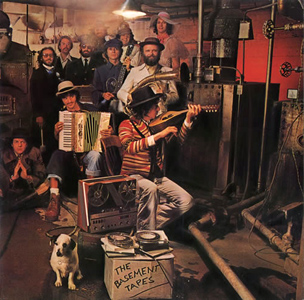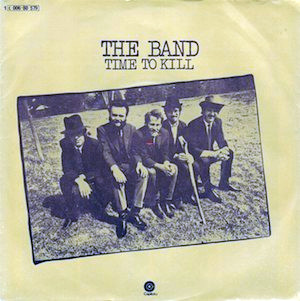Related Research Articles

The Band was a Canadian-American rock band formed in Toronto, Ontario, in 1967. It consisted of Canadians Rick Danko, Garth Hudson, Richard Manuel, Robbie Robertson, and American Levon Helm. The Band combined elements of Americana, folk, rock, jazz, country, and R&B, influencing musicians such as George Harrison, Elton John, the Grateful Dead, Eric Clapton and Wilco.

Music from Big Pink is the debut studio album by the Band. Released in 1968, it employs a distinctive blend of country, rock, folk, classical, R&B, blues, and soul. The music was composed partly in "Big Pink", a house shared by bassist/singer Rick Danko, pianist/singer Richard Manuel and organist Garth Hudson in West Saugerties, New York. The album itself was recorded in studios in New York and Los Angeles in 1968, and followed the band's backing of Bob Dylan on his 1966 tour and time spent together in upstate New York recording material that was officially released in 1975 as The Basement Tapes, also with Dylan. The cover artwork is a painting by Dylan.

The Band is the second studio album by the Canadian-American rock band the Band, released on September 22, 1969. It is also known as The Brown Album. According to Rob Bowman's liner notes for the 2000 reissue, The Band has been viewed as a concept album, with the songs focusing on people, places and traditions associated with an older version of Americana. Thus, the songs on this album draw on historic themes for "The Night They Drove Old Dixie Down", "King Harvest " and "Jawbone".

"The Night They Drove Old Dixie Down" is a song written by Robbie Robertson and originally recorded by the Canadian-American roots rock group the Band in 1969 and released on their eponymous second album. Levon Helm provided the lead vocals. The song is a first-person narrative relating the economic and social distress experienced by the protagonist, a poor white Southerner, during the last year of the American Civil War, when George Stoneman was raiding southwest Virginia. The song appeared at number 245 on Rolling Stone magazine's list of the 500 greatest songs of all time.

The Basement Tapes is the sixteenth album by American singer-songwriter Bob Dylan and his second with the Band. It was released on June 26, 1975, by Columbia Records. Two-thirds of the album's 24 tracks feature Dylan on lead vocals backed by the Band, and were recorded in 1967, eight years before the album's release, in the lapse between the recording and subsequent release of Blonde on Blonde and John Wesley Harding, during sessions that began at Dylan's house in Woodstock, New York, then moved to the basement of Big Pink. While most of these had appeared on bootleg albums, The Basement Tapes marked their first official release. The remaining eight songs, all previously unavailable, feature the Band without Dylan and were recorded between 1967 and 1975.
"Acadian Driftwood" is a song by the Band. It was the fourth track on their sixth studio album Northern Lights – Southern Cross (1975), written by member Robbie Robertson. Richard Manuel, Levon Helm and Rick Danko trade off lead vocals and harmonize on the chorus.
"It Makes No Difference" is a song written by Robbie Robertson and sung by Rick Danko that was first released by The Band on their 1975 album Northern Lights – Southern Cross. It has also appeared on live and compilation albums, including the soundtrack to the film The Last Waltz. Among the artists that have covered the song are Solomon Burke, My Morning Jacket, Trey Anastasio and Over the Rhine.

"The Shape I'm In" is a song by The Band, first released on their 1970 album Stage Fright. It was written by Robbie Robertson, who did little to disguise the fact that the song's sense of dread and dissolution was about Richard Manuel, the song's principal singer. It became a regular feature in their concert repertoire, appearing on their live albums Rock of Ages, Before the Flood, and The Last Waltz. Author Neil Minturn described the song as "straightforward rock." Along with "The Weight," it is one of the Band's songs most performed by other artists. It has been recorded or performed by Bo Diddley, The Good Brothers, The Mekons, The Pointer Sisters, She & Him, Marty Stuart and Nathaniel Rateliff and the Night Sweats.

"Rag Mama Rag" is a song by The Band which was first released on their 1969 album The Band. It was also released as a single, reaching #16 on the UK Singles Chart, the highest position for any single by the group. The single was less successful in the US, reaching only #57 on the Billboard Hot 100.
"Sleeping" is a song by The Band, first released on their 1970 album Stage Fright. It was also released as the B-side to the "Stage Fright" single. It was co-written by Robbie Robertson and Richard Manuel. This and “Just Another Whistle Stop” are the only two songs Manuel receives credit for on the album. Music critic Barney Hoskyns rates it as "one of Richard [Manuel's] liveliest performances" and "one of The Band's most intricate arrangements." The Band never featured the song on a live album.
"Daniel and the Sacred Harp" is a song written by Robbie Robertson that was first released by The Band on their 1970 album Stage Fright. It has been covered by such artists as Barrence Whitfield.
"When You Awake" is a song written by Robbie Robertson and Richard Manuel that was first released on The Band's 1969 self-titled album The Band. A live performance was included on the Bob Dylan and The Band live album Before the Flood.

"Whispering Pines" is a song written by Richard Manuel and Robbie Robertson that was first released by The Band on their self-titled 1969 album The Band. It was released as a single in France, backed by "Lonesome Suzie".

"Ophelia" is a song written by Robbie Robertson that was first released by The Band on their 1975 album Northern Lights – Southern Cross. It was the lead single from the album. It has also appeared on several of the group's live and compilation albums, and has been covered by such artists as Vince Gill and My Morning Jacket.

"Time to Kill" is a song written by Robbie Robertson that was first released by the Band on their 1970 album Stage Fright. It was also released as a single off the album, backed with the more famous "The Shape I'm In" and, although it failed to reach the Top 40 in the United States, it peaked at #13 in the Netherlands. It has also been featured on several Band compilation and live albums.
"Jemima Surrender" is a song written by Levon Helm and Robbie Robertson. It was first released on the Band's self-titled album in 1969. Usual Band drummer Levon Helm played guitar and sang the lead vocal while usual Band pianist Richard Manuel played drums. The song's lasciviousness helped inspire Naomi Weisstein to form the Chicago Women's Liberation Rock Band.
"The W.S. Walcott Medicine Show" is a song written by Robbie Robertson that was first released on the Band's 1970 album Stage Fright. It was also frequently performed in the group's live sets and appeared on several of their live albums. Based on Levon Helm's memories of minstrel and medicine shows in Arkansas, the song has been interpreted as an allegory on the music business. Garth Hudson received particular praise for his tenor saxophone playing on the song.
"The Unfaithful Servant" or "Unfaithful Servant" is a song written by Robbie Robertson that was first released by The Band on their 1969 album The Band. It was also released as the B-side of the group's "Rag Mama Rag" single. It has also appeared on several of the Band's live and compilation albums.
"4% Pantomime" is a song written by Robbie Robertson and Van Morrison. It was first released on the Band's 1971 album Cahoots.

The Night They Drove Old Dixie Down: The Best of the Band Live in Concert is a 1990 compilation of live recordings from American roots rock group the Band released by CEMA Special Markets.
References
- 1 2 3 4 5 6 7 Hoskyns, B. (2006). Across the Great Divide: The Band and America. Hal Leonard. ASIN B001C4QHK0.
- 1 2 3 4 5 Marcus, G. (2015). Mystery Train: Images of America in Rock 'n' Roll Music (6th ed.). Plume. ASIN B00L9AY1RS.
- 1 2 3 4 5 Ward, T. "Across the Great Divide". Allmusic . Retrieved 2015-06-07.
- ↑ DeRiso, N. (12 September 2013). "Across the Great Divide: The Band, "Across the Great Divide" from The Band (1969)". Something Else!. Retrieved 2015-06-07.
- 1 2 Harris, C. (2014). The Band. Rowman & Littlefield. pp. 95, 101, 136. ISBN 9780810889040.
- ↑ Minturn, N. (2005). The Last Waltz of The Band. Pendragon Press. p. 34. ISBN 9781576470930.
- ↑ Rich, F. (May 26, 1975). "Elvis Presley as Moby Dick". The Village Voice . p. 41. Retrieved 2015-06-07.
- ↑ Kemp, M. (2004). Brackett, N. (ed.). The New Rolling Stone Album Guide (4th ed.). Fireside. p. 43. ISBN 0743201698.
- ↑ Ziaukus, T. (December 29, 1984). "Buchanan Gig Features the High-Priced Blues". Pittsburgh Post-Gazette . p. 23.
- ↑ Christgau, R. (December 4, 1969). "Rock & Roll &". The Village Voice . p. 64. Retrieved 2015-06-07.